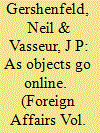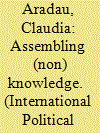|
|
|
Sort Order |
|
|
|
Items / Page
|
|
|
|
|
|
|
| Srl | Item |
| 1 |
ID:
127926


|
|
|
|
|
| Publication |
2014.
|
| Summary/Abstract |
Since 1969, when the first bit of data was transmitted over what would come to be known as the Internet, that global network has evolved from linking mainframe computers to connecting personal computers and now mobile devices. By 2010, the number of computers on the Internet had surpassed the number of people on earth.
|
|
|
|
|
|
|
|
|
|
|
|
|
|
|
|
| 2 |
ID:
157068


|
|
|
|
|
| Summary/Abstract |
Critical analyses of security have focused on the production of knowledge, techniques, and devices that tame unknowns and render social problems actionable. Drawing on insights from, science and technology studies and the emerging interdisciplinary field of “ignorance studies,” this article proposes to explore the enactment of non-knowledge in security and legal practices. Starting with legal challenges brought against the NSA and other intelligence agencies after the Snowden revelations about mass surveillance, it shows how different modes of non-knowledge are enacted and not just “tamed”: uncertainty, ignorance, secrecy, ambiguity, and error. The enactment of non-knowledge has important implications for how we understand security practices, the relation between security and law, and public challenges to mass surveillance in a digital world. On the one hand, the enactment of non-knowledge by security and legal professionals limits activist and NGO resistance to mass surveillance, when these are focused on claims to knowledge, disclosure, and transparency. On the other, reassembling non-knowledge and knowledge differently has generative political effects and opens new possibilities for intervention and resistance.
|
|
|
|
|
|
|
|
|
|
|
|
|
|
|
|
| 3 |
ID:
132064


|
|
|
|
|
| Publication |
2014.
|
| Summary/Abstract |
Kony 2012, a film released by the nonprofit Invisible Children in the spring of 2012, drew a flurry of Facebook "shares" and "likes." However, critics expressed a concern that the film offered a distorted portrayal of Africans and African politics. In this article, we test these criticisms by asking what effects the film had on college students' perceptions of Africa and Africans. To address this question, we draw on a survey and an experiment conducted at a small liberal arts college where Kony 2012 enjoyed popularity. The results show that the film did affect students' perceptions of Africa; specifically, it led many to perceive Africans as lacking agency and autonomy. We argue that whereas the film did have initial negative effects on students' perceptions of Africa, these effects seem to fade over time. Future research should explore the compounding effects of exposure to images that misrepresent the African continent.
|
|
|
|
|
|
|
|
|
|
|
|
|
|
|
|
|
|
|
|
|